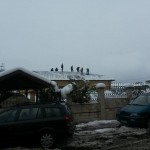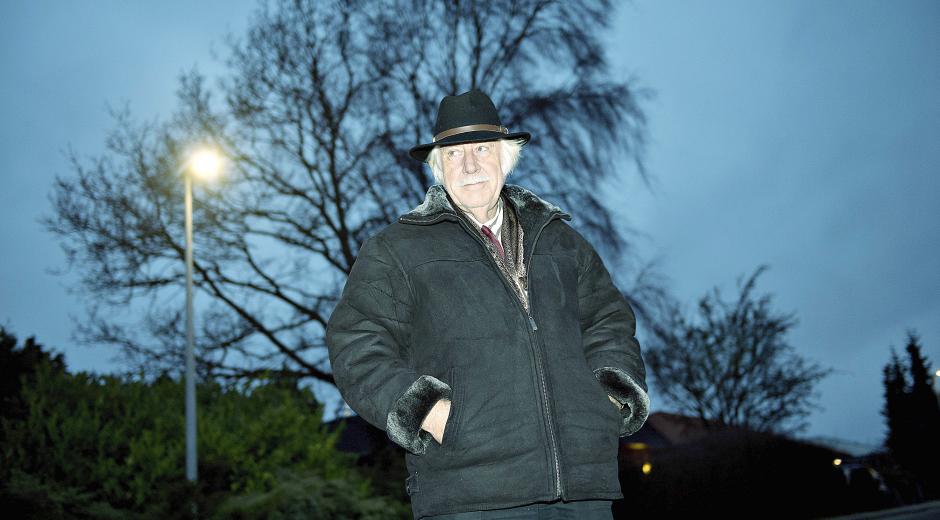First Snow in Bulgaria
Current Status of Chaplaincy in Bulgaria

This update on the current status of Chaplaincy in Bulgaria became necessary in light of the recent parliament vote (October 5, 2014) and consecutive talks on Bulgaria’s national security and upcoming defense reforms. While the government enters a post-election mode to appoint all cabinet members, the legal question about chaplaincy in Bulgaria still remains open. A decade after entering NATO and the European Union as a fully ratified member, Bulgaria is the only country within both organizations without military (or any otherwise legalized) chaplaincy.
About the same amount of time has passed since we established the Bulgarian Chaplaincy Association with the publication of its strategic program “Underground Chaplaincy in Bulgaria” and the establishment of our Masters Program in Chaplaincy Ministry in Sofia. Since that time, many international organizations have contributed to the chaplaincy restoration process with research and historic publications or occasional chaplaincy seminars and conferences across the country. Among them are Military Chaplain Fellowship (MCF), Military Ministries International (MMI), Ministry to the Military, various (IAEC), Chaplaincy Commissions and many others.
However, with these investments of time and resources in the cause, changes within Bulgaria’s law are still to be made and our military personnel remain without active duty chaplains. This result simply proves once again that restoring chaplaincy in Bulgaria cannot and should not be an external process dictated by organizational agendas which are separated from the people. On the contrary, the necessary changes must emerge from grassroots, from among the people, in order to be fully politically realized as both necessity and empowerment.
In this process, the role of the local church is also detrimental. It is certainly a great effort that individual ministers and their teams visit prisoners on weekly or monthly basis. It is also admirable that emergency outfits formed by church members quickly respond to what now seems a constant chain of disastrous events (flooding, earthquakes, freezing weather, etc.). But if the bottom line of results does not affect the changes within the system that can make chaplaincy legally available within both military and civil organization all otherwise attractive efforts are simply futile. They not only miss the mark, but exhaust time and resources of the church and are overall obstructive to the goal at hand.
Therefore, changes within the current status of chaplaincy in Bulgaria must be sought once again with a unifying strategy that uses small but crucial milestones to promote change within the current legal and army systems. Otherwise, the restoration of chaplaincy will be forced again in the periphery of political and social issues and will never become a real priority.
More Publications on the Topic and History of Events:
- Chaplaincy Conference and Master’s of Chaplaincy
- Chaplaincy Course in Yambol, BULGARIA
- Bulgarian Chaplaincy Association Annual Meeting
- Family Seminar for Military Men and Women
- Cup & Cross Ministries in Church of God Publications
- The Case of a NATO Chaplaincy Model within the Bulgarian Army
- 10 Years of Military Ministry in Bulgaria
- Bulgarian Chaplaincy Associations Recognized by U.S. Department of State
- National Chaplaincy Conference
- Bulgarian Chaplaincy Association Gains Legal Status
- Chaplain Dees Visits Bulgaria
- Chaplaincy Course at the Bulgarian Evangelical Theological Institute
- Bulgarian Chaplaincy Association
- Meeting the NATO Chaplain
- National Chaplaincy Meeting
- Chaplaincy Developments in Bulgaria
- U.S. Bases in Bulgaria
- National Chaplaincy Meeting
- Chaplaincy in Bulgaria
- HEALTHCARE CHAPLAINCY IN BULGARIA
- Chaplaincy in Bulgaria
- Mission Bulgaria
Bulgaria 2014 Signing of the Scrolls
Bulgaria election winner to form minority government
(Reuters) – The winner of Bulgaria’s general election said on Monday it was ready to form a minority government with the support of other parties, after a fractured result that threatens more instability in the Balkan country.
Led by a former bodyguard and karate expert, the centre-right GERB party won around a third of the vote but is likely to find itself dozens of seats short of a majority. That may leave Bulgaria, one of Europe’s poorest countries, with another shaky coalition struggling to solve a bank crisis and revive growth.
A record eight parties were expected to enter parliament, as disappointment with the main parties strengthened the attractions of fringe players.
If a coalition cannot be formed, Bulgarians who have seen their country lurch from one crisis to the next may have to head to the voting booths yet again. The new government will be the fifth in less than two years, during which mass street protests toppled a previous GERB administration and nearly felled its successor.
More instability would also dismay investors. Foreign direct investment has fallen by more than a fifth this year.
In a sign of possible trouble ahead, GERB leader Boiko Borisov warned it would be difficult to form a coalition. Party officials said GERB would look to form a minority government, either alone or with the help of smaller parties.
“We are ready to form a minority government and we expect support from other parties,” Rumiana Bachvarova, a senior GERB official, told a news conference. Another senior GERB official warned Bulgaria could have another election by Christmas if cross-party talks broke down.
Underscoring the high level of disillusionment with the political class, the exit polls suggested voter turnout was the lowest in the 25 years since Bulgaria emerged from communism.
“With such a fragmented parliament, it’s difficult to form a government and it also raises the question of how stable it will be,” said Dimitar Bechev, a political analyst. Bulgarian stocks fell on Monday, bucking a rising regional trend.
“Investors are not excited, for sure, because with a surprisingly big number of parties in the next parliament, the possibility for a reformist majority that can push ahead with reforms is very small,” said Dimitar Georgiev, a trader at the Sofia-based brokerage Elana.
Bulgaria Holds Early Parliamentary Elections
Bulgaria will hold its early parliamentary elections on October 5, 2014. The elections come after much political tension, over a year of constant protests, and a deepening economic crisis expressed most recently in a collapse within the bank sector and a 10% increase of the prices of electricity.
The GERB right-centrists political party is expected to win, but if it will take enough seats in the Bulgarian parliament to form its own government is yet to be seen. Meanwhile, on its resent tour its representatives boldly proclaimed they will not seek coalition with any other political forces namely the leftist Socialist party and the ethnic fractions representing Turkish and other minorities in Bulgaria.
Contrary to this in a recent interview for Routers, GERB’s top leader expressed readiness to collaborate with various political forces including the socialists. Some political parties are also reaching for votes among Bulgarian evangelicals in order to gain momentum in the elections. Evangelicals are not represented by their own party in the current elections, although some Roma evangelical churches are said to have formed a small ethnic political party to reach a better representation.
HISTORY of EVENTS:
Revival Harvest Campaign 2014 in Bulgaria
For the 11th year in a row we have initiated our Revival Harvest Campaign in Bulgaria – a time of intense ministry throughout the whole country. This year we’ve invited a Danish minister by the name of Johny Noer who first came 25 years ago while Bulgaria was still under communism.
In April, 1989 Brother Noer and his Pilgrim Convoy entered Bulgaria from its Southern border. They met with Bulgarian believers under the Regime and ministered in several churches along the way. Their last services were in the Black Sea port city of Varna where 4,000 gathered in the first service alone.
The message he preached was plain and simple. In fact, it contained the exact words he was forbidden by the Communist Police to say after being arrested and his passport taken from him. The words of the message were: “LET MY PEOPLE GO!”
At the Sunday morning service, over 8,000 Bulgarian Christians from the whole country gathered in and around the Pentecostal Church of Varna. They were all surrounded by a dense police cordon. Johny Noer stood at an improvised (makeshift) platform on the roof of the old church building at Lenin Boulevard with a message which shook the spiritual foundations of Bulgaria: “LET MY PEOPLE GO!” No more than seven months later, the communist government in Bulgaria resigned never to take power in the country again.
Exactly a quarter of a century later, we’ve invited brother Johny Noer to Bulgaria again to proclaim the words of the same message to the same people of the same God: “LET MY PEOPLE GO!”
Average Cost of Living in Bulgaria in 2014
| Restaurants | |
| Meal, Inexpensive Restaurant | $6.75 |
| Meal for 2, Mid-range Restaurant, Three-course | $25.00 |
| Combo Meal at McDonalds or Similar | $4.75 |
| Cappuccino (regular) | $1.10 |
| Coke/Pepsi (0.33 liter bottle) | $1.10 |
| Water (0.33 liter bottle) | $0.75 |
| Markets | |
| Milk (regular), (1 gallon) | $3.75 |
| Loaf of Fresh White Bread (16 oz) | $0.50 |
| Rice (white), (16 oz) | $0.65 |
| Eggs (dozen) | $1.85 |
| Local Cheese (1 lb) | $2.75 |
| Chicken Breasts (Boneless, Skinless), (1 lb) | $2.00 |
| Apples (1 lb) | $0.50 |
| Oranges (1 lb) | $0.60 |
| Tomatoes (1 lb) | $0.55 |
| Potatoes (1 lb) | $0.30 |
| Water (1.5 liter bottle) | $0.35 |
| Transportation | |
| One-way Ticket (Local Transport) | $0.55 |
| Taxi (In town trip) | $2.00 |
| Gasoline (1 gallon) | $7.00 |
| Volkswagen Golf 1.4 90 KW Trendline (Or Equivalent New Car) | $22,000 |
| Utilities (Monthly) | |
| Basic (Electricity, Heating, Water, Garbage) for 85m2 Apartment | $125.00 |
| 1 min. of Prepaid Mobile Tariff Local (No Discounts or Plans) | $0.19 |
| Internet (6 Mbps, Unlimited Data, Cable/ADSL) | $10.00 |
| Sports And Leisure | |
| Fitness Club, Monthly Fee for 1 Adult | $15.00 |
| Cinema, International Release, 1 Seat | $5.75 |
| Clothing And Shoes | |
| 1 Pair of Jeans (Levi’s 501 Or Similar) | $85.00 |
| 1 Summer Dress in a Chain Store (Zara, H&M, …) | $50.00 |
| 1 Pair of Nike Shoes | $90.00 |
| 1 Pair of Men’s Leather Shoes | $50.00 |
| Rent Per Month | |
| Apartment (1 bedroom) in City Center | $175.00 |
| Apartment (1 bedroom) outside City Center | $100.00 |
| Apartment (3 bedrooms) in City Center | $200.00 |
| Apartment (3 bedrooms) outside City Center | $165.00 |
| Apartment Price (to Purchase) | |
| Price per Square Meter to Buy Apartment in City Center | $575.00 |
| Price per Square Meter to Buy Apartment Outside City Center | $475.00 |
| Salaries And Financing | |
| Average Monthly Disposable Salary (After Tax) | $325.00 |
| Mortgage Interest Rate in Percentages (%), Yearly | 9.00 |
The following calculations are based on the dollar exchange rate of 1.50. Meaning, each US dollar will get you 1.5 Bulgarian lev. These calculations are also on average. Of course if you live in a bigger city such as the capital you will make a larger salary and the cost of living will increase. And the opposite is true if you live in a village or smaller town.
X Youth Event Reunion
 X 7.7.7 @ Black Sea https://cupandcross.com/x-youth-event-at-the-black-sea-2/
X 7.7.7 @ Black Sea https://cupandcross.com/x-youth-event-at-the-black-sea-2/
X 8.8.8 @ the Heart of Bulgaria https://cupandcross.com/x-2008-in-the-heart-of-bulgaria-a-new-level-of-ministry/
X 9.9.9 @ Gipsy Ghetto of Samokov https://cupandcross.com/2009-x-event-transforming-the-status-quo-2/
X 10.10.10 @ Cyprus https://cupandcross.com/x-10-10-10-cyprus-reflection/
X 11.11.11 @ Chicago https://cupandcross.com/x-11-11-11-youth-event-afterglow/
X 12.12.12 @ End Time Revival https://cupandcross.com/12-12-12-revival-at-the-end-of-the-world/
Master’s Degree of Chaplaincy Ministry in Bulgaria: The Road Ahead
In the beginning of the 21st century in Bulgaria, law and chaplaincy meet on the road to democracy. But before chaplaincy could be legalized completely and endorsed by the state to its full functionality, several changes must be undergone. Some of them are:
1) Legal provision allowing chaplains to work as staff in the army, which guarantees the equal presence of protestant chaplains as well.
2) The approval, acceptance and implementation of a NATO based model for chaplaincy within the structures of the Bulgarian Army.
3) Periodical and systematic educational strategy toward chaplaincy workers among Bulgarian evangelicals.
4) A paradigm for cooperation of Bulgarian chaplains from various ethnic, religious and cultural backgrounds.
5) Further research publications to enhance the efficiency of chaplaincy within the Bulgarian national context.
- Chaplaincy Conference and Master’s of Chaplaincy
- Chaplaincy Course in Yambol, BULGARIA
- Bulgarian Chaplaincy Association Annual Meeting
- Family Seminar for Military Men and Women
- Cup & Cross Ministries in Church of God Publications
- The Case of a NATO Chaplaincy Model within the Bulgarian Army
- 10 Years of Military Ministry in Bulgaria
- Bulgarian Chaplaincy Associations Recognized by U.S. Department of State
- National Chaplaincy Conference
- Bulgarian Chaplaincy Association Gains Legal Status
- Chaplain Dees Visits Bulgaria
- Chaplaincy Course at the Bulgarian Evangelical Theological Institute
- Bulgarian Chaplaincy Association
- Meeting the NATO Chaplain
- National Chaplaincy Meeting
- Chaplaincy Developments in Bulgaria
- U.S. Bases in Bulgaria
- National Chaplaincy Meeting
- Chaplaincy in Bulgaria
- HEALTHCARE CHAPLAINCY IN BULGARIA
- Chaplaincy in Bulgaria
- Mission Bulgaria
Bulgaria Halts Work on South Stream Gas Pipeline
Bulgaria’s prime minister has ordered on Sunday a halt to construction work on the Gazprom-led South Stream pipeline project planned to bypass Ukraine as a transit country and consolidating Russia’s energy grip in Europe. Plamen Oresharski said after meeting U.S. Sens. John McCain, Christopher Murphy and Ron Johnson that he has ordered all work on the disputed project to continue only after consultations with Brussels.
Last week, the European Commission opened an infringement procedure against the Balkan country and asked construction work to be stopped, arguing that Bulgaria hadn’t respected EU internal market rules covering the award of public contracts. The standoff over Ukraine has forced the 28-nation EU into a sudden rethink of its energy policies to make it less reliant on Russia and its state-owned gas company Gazprom.
In particular, the EU decision will affect the South Stream pipeline, in which Russia’s Gazprom holds a 50-percent stake, and would provide an alternative supply route for Bulgaria, Serbia, Croatia, Hungary, Slovenia, Austria and Italy. It is expected to ship up to 63 billion cubic meters of gas from 2018. Bulgaria, which is almost totally dependent on gas supplies from Russia, is trying to avoid another cutoff after it was among those who suffered most of the gas price dispute between Russia and Ukraine in 2009.
Washington had already voiced criticism over Bulgaria’s decision to award the construction of the Bulgarian stretch of South Stream to a consortium led by Russia’s Stroytransgaz — a Russian company subject to U.S. sanctions. In a statement on Friday, U.S. Ambassador Marcie B. Ries voiced “deep concern” over the decision. “Now is not the time for business as usual with Russia,” she said. “We advise Bulgarian businesses to avoid working with entities sanctioned by the United States.” “We understand that there are some issues concerning the South Stream pipeline project,” McCain said Sunday and added that “obviously we want as little Russian involvement as possible.”









![south_stream[1]](https://cupandcross.com/wp-content/uploads/2014/06/south_stream1.png)





